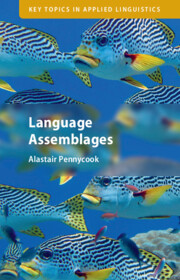Book contents
- Language Assemblages
- Key Topics in Applied Linguistics
- Language Assemblages
- Copyright page
- Contents
- Acknowledgements
- 1 Why Language Assemblages?
- 2 Language, Knowledge, Myths and Being
- 3 Structures and Practices
- 4 Linguistic, Semiotic and Sociomaterial Assemblages
- 5 Other Language Ontologies
- 6 Applied Linguistics as Practical Assemblage
- Suggested readings
- Glossary
- References
- Index
6 - Applied Linguistics as Practical Assemblage
Published online by Cambridge University Press: 20 June 2024
- Language Assemblages
- Key Topics in Applied Linguistics
- Language Assemblages
- Copyright page
- Contents
- Acknowledgements
- 1 Why Language Assemblages?
- 2 Language, Knowledge, Myths and Being
- 3 Structures and Practices
- 4 Linguistic, Semiotic and Sociomaterial Assemblages
- 5 Other Language Ontologies
- 6 Applied Linguistics as Practical Assemblage
- Suggested readings
- Glossary
- References
- Index
Summary
This book sets out to look at what language is and what languages are with a view to arriving not at one practical theory of language, but rather at ways of assembling practical ways of thinking about language, or understanding applied linguistics as a practical assemblage. Rather than thinking about applied linguistics in disciplinary or interdisciplinary terms, this view suggests the coming together of language-oriented projects (social or educational endeavours that involve language), practical theories of language (different ways of approaching linguistic questions) and critical appraisals (ethical, material and political concerns). As applied linguists, we have to start to take responsibility for the ways we think about language. Approaches to language that derive from attempts to describe language structures or to account for language use in structural terms may not be so useful. The terrain has changed from when applied linguistics was first seen as the application of linguistic knowledge to real-world contexts. We can now start to think seriously about practical theories of language or ways of thinking about language that derive from contexts of practice.
- Type
- Chapter
- Information
- Language Assemblages , pp. 136 - 153Publisher: Cambridge University PressPrint publication year: 2024

